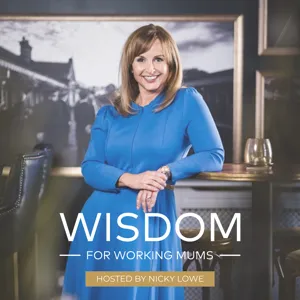Podcast Summary
The Power of Flexibility: In Insurance and Beyond: The BBC podcast discusses the value of flexibility through UnitedHealthcare's customizable insurance plans and the importance of LinkedIn for job seekers. Nobel Prize winner Claudia Goldin's research underscores the significance of addressing gender disparities in employment and pay.
Flexibility is a valuable asset in various aspects of life, whether it's through practicing yoga or having flexible insurance coverage or finding the right job. The BBC podcast highlights the importance of flexibility through its sponsor, UnitedHealthcare Insurance Plans, which offer budget-friendly and customizable coverage options. Additionally, the podcast emphasizes the power of LinkedIn for hiring professionals, especially those who may not be actively looking for new opportunities. Meanwhile, the Nobel Memorial Prize in Economics was awarded to Claudia Goldin for her groundbreaking research on women's employment and pay. Goldin's work sheds light on the historical and ongoing challenges women face in the workforce and the importance of recognizing and addressing gender disparities. As the third woman and the first solo female laureate in the prize's history, Goldin's achievements underscore the significance of studying and addressing issues related to women and gender. In summary, the podcast and the Nobel Prize announcement both highlight the importance of flexibility and recognition in various aspects of life, from insurance coverage and job searching to economic research and gender equality.
From Childhood Curiosity to Economic Detective: Renowned economist Claudia Goldin's passion for uncovering hidden truths began as a child and led her to focus on economic history, where she made groundbreaking discoveries in labor markets
Claudia Goldin, a renowned economist, was always drawn to the role of a detective, seeking answers to intriguing questions. Her fascination began as a child, when she was captivated by archaeology and the mysteries of ancient civilizations. This curiosity continued into her education at a scientifically focused high school and Cornell University, where she initially pursued science before discovering economics. Goldin's passion for uncovering hidden truths led her to focus on economic history, where she made groundbreaking discoveries by unearthing overlooked documents in dusty archives. Her research primarily centered around labor markets, exploring the connection between education, employment, and wages. Goldin's dedication to unraveling historical economic puzzles has resulted in a distinguished career and numerous influential studies.
Exploring the root causes of gender wage gaps: Nobel Prize-winning economist Claudia Goldin delves deeper into the complex factors influencing gender wage gaps, including education, technology, automation, and household dynamics.
Nobel Prize-winning economist Claudia Goldin's work goes beyond just studying the gender pay gap. Instead, she delves deeper into the root causes of wage disparities between men and women. Goldin's research explores the complex web of factors influencing wages, including education, technology, automation, and household dynamics. By examining the economic context of gender wage gaps, she offers a more nuanced understanding of this persistent issue. Despite progress in narrowing the gap, Goldin continues to investigate why women still earn less than men and how various economic factors contribute to this disparity.
Impact of contraceptive pill on women's career choices in the 1970s: The contraceptive pill expanded women's access to male-dominated careers, but the gender pay gap persists today.
The gender pay gap widened significantly for women after they had children, while men experienced no financial penalty. Economist Claudia Goldin's research sheds light on this issue, specifically examining the impact of the contraceptive pill on women's career choices in the 1970s. Before the pill, young women had limited access to it and were mostly excluded from male-dominated fields such as medicine, law, and engineering. However, as access to the pill expanded, more women entered these career-intensive fields, leading to a rapid increase in female representation. By 1980, these fields saw a third of their students as women. This shift was significant, but the gender pay gap persists today. In her book "Career and Family: Women's Century-Long Journey Towards Equity," Goldin explores why these issues remain relevant, suggesting that progress towards pay equity has been slow and ongoing.
The Challenge of Balancing 'Greedy Jobs' and Family Responsibilities: The concept of 'greedy jobs' poses a significant challenge for working parents, particularly women, who often bear the brunt of family caregiving responsibilities. These jobs demand constant attention and intrude on personal time, leaving one parent unable to fully meet both work and family needs.
That according to author Claudia Goldin, the concept of "greedy jobs" presents a significant challenge for working parents. A greedy job is one that demands constant attention and often intrudes on personal time, making it impossible to balance with the demands of parenthood. Goldin argues that only one parent can satisfactorily hold a greedy job, often leaving the other parent to handle the responsibilities of raising a family. This issue disproportionately affects women, who are often the primary caregivers. Despite this challenge, Goldin remains optimistic about finding solutions to enable working parents to balance their careers and family responsibilities more effectively.
Historian Ruth Mazer discusses gender equality and hybrid work: The shift to hybrid work could eliminate 'greedy jobs' and potentially advance gender equality. Meanwhile, the fashion industry exploits young workers, and health insurance remains essential.
The shift to hybrid work due to the pandemic could be the most significant advancement for gender equality in the last few decades, according to historian Ruth Mazer. During a conversation with Freakonomics author Steve Levitt, Mazer agreed that this change presents an opportunity to eliminate "greedy jobs," which are a major hindrance to gender equality. Meanwhile, in a different context, the BBC podcast "World of Secrets" explores the dark side of the fashion industry, revealing how young men were exploited in the case of Abercrombie and Fitch. Despite the rapid changes ahead, one thing that remains constant is the need for health insurance. UnitedHealthcare TriTerm Medical plans offer flexible and budget-friendly coverage for those in between jobs or who missed open enrollment.
UnitedHealthcare's TriTerm Medical Plans and Mother's Day Gifts: Secure future healthcare with UnitedHealthcare's TriTerm Medical Plans and celebrate moms with savings on Mother's Day gifts at 1-800-Flowers.com
UnitedHealthcare's TriTerm Medical Plans offer comprehensive healthcare coverage for the next three years, providing peace of mind for unexpected health issues. This may be an excellent option for those seeking long-term security. Additionally, Mother's Day is around the corner, and 1-800-Flowers.com offers various ways to celebrate moms with handmade bouquets, sweet treats, gourmet food, and unique gifts. As a special offer, customers can save up to 40% on Mother's Day bestsellers. Don't forget to show appreciation to the special moms in your life and secure your healthcare plan for the future. Visit uhone.com for more information on UnitedHealthcare TriTerm Medical Plans and 1-800-Flowers.com for Mother's Day gifts.






